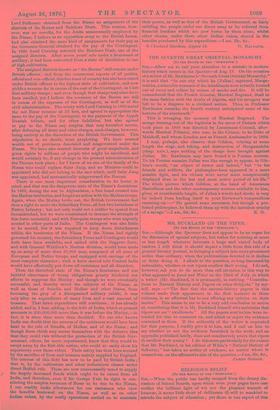THE SEVENTH GREAT ORIENTAL MONARCHY.
(To THE EDITOR OF THE "SPECTATOR.')
SI11,—Allow me to call your attention to a mistake in modern history which occurs in the Spectator of Aug. 19. On the occasion- of a review of Mr. Rawlinson's "Seventh Great Oriental Monarchy," it is said that "in one city which he [Julian] captured, Maoga- malcha, a miserable remnant of the inhabitants were actually hunted out of caves and cellars by means of smoke and fire. It will be remembered that the French General, Marshal Bugeaud, dealt in the same fashion with the Arabs of Algeria, and his savagery was- felt to be a disgrace to a civilised nation. Thus, as Professor Rawlinson remarks, the fourth century anticipated some of the horrors of the nineteenth."
This is wronging the memory of Marshal Bugeaud. The savage burning-out of the fugitives in the caves of Dahara which took place in 1846 was directed by Lieutenant-Colonel, after- wards Marshal Pelissier, who rose, in the Crimea, to be Duke of Malakoff, and whom London saw as French Ambassador in 1858.
I may, perhaps, also observe that Gibbon, relating at some- length the siege, and taking, and destruction of Maogamalcha (chap. xxiv.), says nothing of the charge here brought against Julian. Mr. Rawlinson may have found it in Persian sources. To his Persian enemies Julian was like enough to appear, in Gib- bon's words, "an object of terror and hatred," but "to his friends and soldiers, the philosopher-hero appeared in a more. amiable light, and his virtues were never more conspicuously displayed than in the last and most active period of his life."' The whole picture which Gibbon, at the hand of Ammianus Marcellinus and the other contemporary sources available to him, gives, at considerable length, of Julian's words and deeds, is very far indeed from lending itself to your Reviewer's compendious summing-up :—" He gained some successes, but though a pro- fessed philosopher, he followed them up with the merciless cruelty


































 Previous page
Previous page